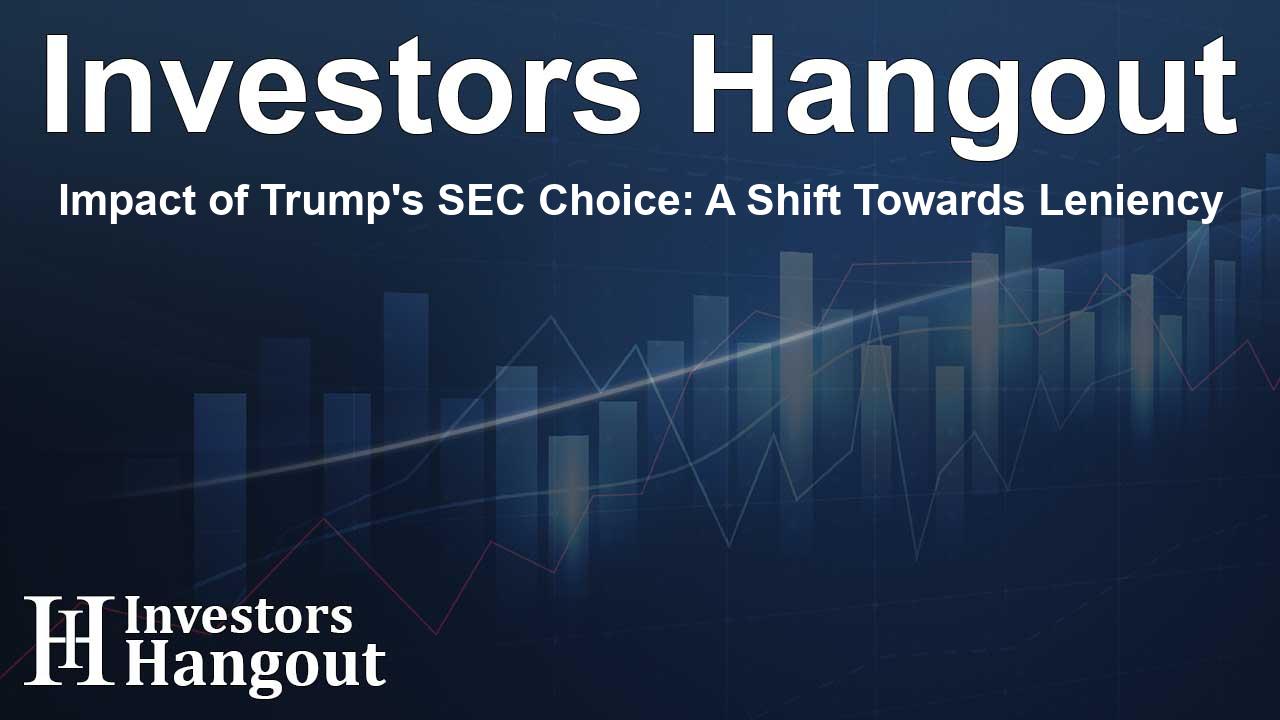Impact of Trump's SEC Choice: A Shift Towards Leniency

Potential Shift in SEC Enforcement with Trump's Nominee
The selection of Paul Atkins for the SEC under President Trump reveals a significant evolution in how financial regulations may be enforced. During his previous tenure at the Securities and Exchange Commission, Atkins notably opposed many enforcement actions against prominent corporations. His past voting behavior signifies a potentially softer approach to regulation and oversight.
Atkins' Enforcement Record and Its Implications
Atkins, who served as a commissioner from 2002 to 2008, documented a remarkable dissent from the majority on at least ten occasions regarding enforcement decisions aimed at larger corporations. These instances included high-profile entities such as Citigroup and IBM. This history raises questions about the agency's direction under his leadership.
Historical Context of Enforcement Actions
Historically, the SEC has enforced penalties rigorously, especially following crises like Enron and WorldCom. However, Atkins expressed skepticism toward the SEC’s enforcement methods, arguing that imposing fines adversely affects investors and shareholders rather than addressing wrongdoing effectively.
Future Enforcement Focus and its Concerns
Under Atkins' expected guidance, the SEC’s focus may pivot to misconduct directly causing investor losses, such as scams, while possibly sidelining corporate malfeasance that presents systemic risks. Industry critics worry this shift could endanger the financial marketplace's integrity.
Reactions from Former SEC Officials
Responses from former SEC officials indicate varied opinions on how Atkins' appointment will shape the agency. Tyler Gellasch, a former SEC officer, noted that Atkins' nomination might ease the pressures facing compliance staffers, likely reflecting an overall reduction in the prevalence of heavy-handed regulatory oversight.
Atkins' Approach to Compliance and Corporate Accountability
Throughout his prior term, Atkins was known for his meticulous examination of enforcement actions, often challenging recommendations made by SEC staff. This propensity for detailed scrutiny reflects his belief that enforcement actions should be targeted and precise, aiming for a collaborative relationship between regulators and corporations.
Possible Outcomes for Corporate America
The broader implication of Atkins' anticipated lead is a more favorable climate for major corporations, especially as they grapple with ongoing scrutiny and regulatory hurdles. Companies such as Tesla, Coinbase Global, BlackRock, and others could see changes in how the SEC approaches regulatory actions moving forward.
Critiques and Challenges Ahead
While some sectors may welcome a lenient regulatory environment, others argue it poses risks by allowing larger corporations to evade accountability. Several industry experts underline the importance of maintaining a vigilant oversight framework to protect investors and uphold market integrity.
Conclusion: A New Era of Regulation?
Paul Atkins' nomination signals potential changes in SEC enforcement strategies, moving towards a landscape that might prioritize appeasement over accountability. As the SEC reshapes its approach, businesses and investors alike are poised to observe how these alterations will impact corporate conduct and regulatory compliance.
Frequently Asked Questions
1. Who is Paul Atkins, and what is his role in the SEC?
Paul Atkins is the SEC nominee by President Trump, expected to influence the commission's enforcement strategy significantly.
2. How did Atkins previously vote on enforcement actions?
Atkins voted against numerous enforcement actions during his earlier tenure, showcasing his willingness to dissent from the majority.
3. What might change under Atkins' leadership at the SEC?
Under Atkins, the SEC could adopt a more lenient enforcement approach, focusing more on investor fraud than on corporate misdeeds.
4. Why do some critics oppose a lenient SEC?
Critics argue that lenient oversight risks allowing major corporations to engage in harmful practices without accountability, jeopardizing investor protection.
5. What industries could be most affected by the SEC's potential policy changes?
High-profile industries like technology, finance, and energy could be significantly impacted, particularly companies like Tesla and Coinbase Global.
About The Author
Contact Hannah Lewis privately here. Or send an email with ATTN: Hannah Lewis as the subject to contact@investorshangout.com.
About Investors Hangout
Investors Hangout is a leading online stock forum for financial discussion and learning, offering a wide range of free tools and resources. It draws in traders of all levels, who exchange market knowledge, investigate trading tactics, and keep an eye on industry developments in real time. Featuring financial articles, stock message boards, quotes, charts, company profiles, and live news updates. Through cooperative learning and a wealth of informational resources, it helps users from novices creating their first portfolios to experts honing their techniques. Join Investors Hangout today: https://investorshangout.com/
The content of this article is based on factual, publicly available information and does not represent legal, financial, or investment advice. Investors Hangout does not offer financial advice, and the author is not a licensed financial advisor. Consult a qualified advisor before making any financial or investment decisions based on this article. This article should not be considered advice to purchase, sell, or hold any securities or other investments. If any of the material provided here is inaccurate, please contact us for corrections.
